Annoying, unhealthy and inescapable, noise levels in Bangkok are on the increase – and yet little or nothing is apparently being done to curb this much-hated phenomenon
By Maxmilian Wechsler
By Maxmilian Wechsler
| LUCKY but precious few are those Bangkok citizens who are not a victim of noise pollution in some way or another. Day and night it assails us in dozens of different but equally annoying and frustrating forms, and yet there doesn’t seem much of an effort to reduce it, or even control it. What’s more, to the detriment of our health and wellbeing, the amount of noise we have to suffer just seems to increase year in, year out. More than ten years ago, in 2004, His Majesty King Bhumibol Adulyadej raised the issue of excessive noise in his birthday speech. Among other concerns, the King expressed worries about young people developing hearing problems. Following the speech, the government quickly implemented various programs to monitor and reduce noise levels in public places and venues like discotheques and other entertainment places. The Department of Land Transport was instructed to check the noise levels of their vehicles. Factories were also told to reduce loud noises. Unfortunately, as time went on, these important health and sanity saving measures slowly disappeared. |
The Pollution Control Department (PCD) under the Ministry of Natural Resources and Environment has noise monitoring stations in the Bangkok Metropolitan area. The PCD publishes daily noise levels on its English-language website, with more detailed information on its Thai website. This is a step in the right direction, but obviously giving information about noise pollution doesn’t do anything to reduce it.
The intensity of loudness is measured in Decibels (dB). Similar to temperature, the scale can dip below zero. For example, some people with very good hearing can detect sounds as low as -15 dB. The PCD noise index standards list 55-70 dB in the moderate level, while anything over that is considered unhealthy for humans. Sounds over 85 dB can cause permanent damage to hearing.
Exposure to noise over 100 dB for a sustained period of time can cause hearing loss. This is about the noise level at some Bangkok cinemas! Normal conversation is about 60 dB, not loud enough to present a health risk, but a single sharp whistle blast ranges between 104 to 116 dB. If you are unfortunate enough to be within earshot of one of Bangkok’s many hyperactive car park security guards on a regular basis, you may be doing some serious damage to your eardrums.
Although it is often overlooked, noise pollution can take as great a toll on health as other forms of pollution. Frequent exposure to high noise levels can result in many serious conditions – physical, mental and emotional – besides hearing loss. Problems brought on or aggravated by loud noises include high blood pressure, sleep deprivation, aggressiveness, heart problems, distraction, irritability, stress, indigestion, ulcers, anxiety, headaches and heartburn. While lasting hearing damage is usually attributed to high frequency noise, evidence links low frequency noise to nausea and heart palpitations.
Tens of millions of people around the world are exposed to levels of noise pollution great enough to affect their quality of life and productivity. The problem is recognized by the World Health Organization, the United Nations Environmental Protection Agency and the National Institutes of Health, one of the world’s foremost medical research centers under the US Department of Health.
It could be worse!
Whether you’re indoors or outside, there’s no escaping noise in Bangkok, but many people might be surprised to learn that the Thai capital is not on the list of the world’s 10 noisiest cities. India has the dubious distinction of being the leading country in terms of noise pollution, although there is some debate as to which of its cities is the noisiest.
According to the latest report posted by the US-based CitiQuiet website in July, the noisiest city in the world is Mumbai, followed by Kolkata, Cairo, Delhi, Tokyo, Madrid, New York, Buenos Aires, Shanghai and Karachi.
Another survey published in October 2013 by the US Centre for Hearing and Communications has Delhi in first place followed by Mumbai, Kolkata, Cairo, Tokyo, Madrid, New York, Buenos Aires, Shanghai and Karachi.
A survey conducted by the government of Maharashtra State, India, in June placed Mumbai ahead of Delhi as the noisiest city in the world.
Despite a crackdown on excessive noise under former Mayor Michael Bloomberg, New York is also a regular on such lists. An AP article says “screeching subway trains, honking cars, roaring planes, barking dogs and boisterous people make noise the Big Apple’s No. 1 quality-of-life complaint, based on about 300,000 calls every year to the city’s 311 complaint hotline.”
Under the city’s tough noise codes, every construction site must post a noise mitigation plan, while excessive noise from restaurants and vehicles is illegal.
Tickets range from US$70 (about 2,200 baht) for a barking dog to as much as $8,000 for a nightclub playing loud music. But despite thousands of violation notices filed, health officials warn there are still many places where noise levels top 85 dB, and some parts of the city frequently exceed 100 dB.
At the other end of the spectrum, the quietest cities in the world, according to the ePROFITS website based in Canada, are: Pyongyang, Yinchuan in China; Hartford in the US state of Connecticut; Brisbane, Australia; and Singapore. Vientiane in neighboring Laos also has a reputation for being very quiet.
Types of noise pollution
Noise pollution in Bangkok can be attributed to a great many sources, with the ones mentioned below topping the list.
The intensity of loudness is measured in Decibels (dB). Similar to temperature, the scale can dip below zero. For example, some people with very good hearing can detect sounds as low as -15 dB. The PCD noise index standards list 55-70 dB in the moderate level, while anything over that is considered unhealthy for humans. Sounds over 85 dB can cause permanent damage to hearing.
Exposure to noise over 100 dB for a sustained period of time can cause hearing loss. This is about the noise level at some Bangkok cinemas! Normal conversation is about 60 dB, not loud enough to present a health risk, but a single sharp whistle blast ranges between 104 to 116 dB. If you are unfortunate enough to be within earshot of one of Bangkok’s many hyperactive car park security guards on a regular basis, you may be doing some serious damage to your eardrums.
Although it is often overlooked, noise pollution can take as great a toll on health as other forms of pollution. Frequent exposure to high noise levels can result in many serious conditions – physical, mental and emotional – besides hearing loss. Problems brought on or aggravated by loud noises include high blood pressure, sleep deprivation, aggressiveness, heart problems, distraction, irritability, stress, indigestion, ulcers, anxiety, headaches and heartburn. While lasting hearing damage is usually attributed to high frequency noise, evidence links low frequency noise to nausea and heart palpitations.
Tens of millions of people around the world are exposed to levels of noise pollution great enough to affect their quality of life and productivity. The problem is recognized by the World Health Organization, the United Nations Environmental Protection Agency and the National Institutes of Health, one of the world’s foremost medical research centers under the US Department of Health.
It could be worse!
Whether you’re indoors or outside, there’s no escaping noise in Bangkok, but many people might be surprised to learn that the Thai capital is not on the list of the world’s 10 noisiest cities. India has the dubious distinction of being the leading country in terms of noise pollution, although there is some debate as to which of its cities is the noisiest.
According to the latest report posted by the US-based CitiQuiet website in July, the noisiest city in the world is Mumbai, followed by Kolkata, Cairo, Delhi, Tokyo, Madrid, New York, Buenos Aires, Shanghai and Karachi.
Another survey published in October 2013 by the US Centre for Hearing and Communications has Delhi in first place followed by Mumbai, Kolkata, Cairo, Tokyo, Madrid, New York, Buenos Aires, Shanghai and Karachi.
A survey conducted by the government of Maharashtra State, India, in June placed Mumbai ahead of Delhi as the noisiest city in the world.
Despite a crackdown on excessive noise under former Mayor Michael Bloomberg, New York is also a regular on such lists. An AP article says “screeching subway trains, honking cars, roaring planes, barking dogs and boisterous people make noise the Big Apple’s No. 1 quality-of-life complaint, based on about 300,000 calls every year to the city’s 311 complaint hotline.”
Under the city’s tough noise codes, every construction site must post a noise mitigation plan, while excessive noise from restaurants and vehicles is illegal.
Tickets range from US$70 (about 2,200 baht) for a barking dog to as much as $8,000 for a nightclub playing loud music. But despite thousands of violation notices filed, health officials warn there are still many places where noise levels top 85 dB, and some parts of the city frequently exceed 100 dB.
At the other end of the spectrum, the quietest cities in the world, according to the ePROFITS website based in Canada, are: Pyongyang, Yinchuan in China; Hartford in the US state of Connecticut; Brisbane, Australia; and Singapore. Vientiane in neighboring Laos also has a reputation for being very quiet.
Types of noise pollution
Noise pollution in Bangkok can be attributed to a great many sources, with the ones mentioned below topping the list.
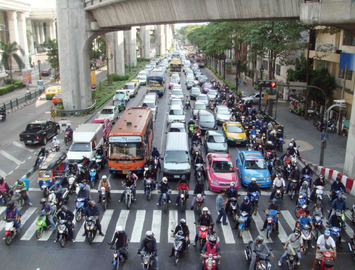
Traffic: The city’s chronically congested roads generate dangerous levels of noise along with greenhouse gases. With all the passenger cars, pickup trucks, buses, trucks and motorcycles on the streets, pedestrians talking on mobiles often can’t hear what the other party is saying.
Tuk-tuks: Special attention should be given to the three-wheelers that have been terrorizing people in Bangkok for decades. Even though many have been converted from petrol to natural gas to reduce air pollution, their engines still make enough noise that can be heard clearly inside nearby residences and offices. Several companies in Thailand now manufacture electric tuk-tuks that are totally quiet. Legislation allowing only electric tuk-tuks on Thailand’s roads would go a long way toward alleviating noise pollution.
Vendor trucks with speakers: You can see them with loud speakers mounted on top, usually selling fruits and vegetables or publicizing an upcoming boxing match, driving slowly on side streets in Bangkok suburbs and even in the heart of the city. One expat said they often ply his Soi on Sukhumvit Road as early as 7am, even on Sundays, and wake up his entire family. Some mobile vendors use other devices to attract attention, including pre-recorded music, bells and squeeze horns.
Converted vehicles: Many cars and motorcycles are extremely loud because of modified exhaust systems. A roaring exhaust system can be heard and felt over a wide distance, rattling windows and travelling through walls.
‘Boom cars’ so beloved by young men are fitted with powerful audio systems with a pounding bass that penetrates a wide area. Some tour coaches and mini vans are fitted with these sound systems. Encountering one on the highway can be quite unnerving.
When vehicles with exhaust modifications or powerful audio systems cruise in a semi-enclosed area, such as along high-rise lined Silom Road under the BTS, the noise is magnified and can be unbearable. Such drivers are clearly lacking in common sense and regard for their fellow citizens.
Tuk-tuks: Special attention should be given to the three-wheelers that have been terrorizing people in Bangkok for decades. Even though many have been converted from petrol to natural gas to reduce air pollution, their engines still make enough noise that can be heard clearly inside nearby residences and offices. Several companies in Thailand now manufacture electric tuk-tuks that are totally quiet. Legislation allowing only electric tuk-tuks on Thailand’s roads would go a long way toward alleviating noise pollution.
Vendor trucks with speakers: You can see them with loud speakers mounted on top, usually selling fruits and vegetables or publicizing an upcoming boxing match, driving slowly on side streets in Bangkok suburbs and even in the heart of the city. One expat said they often ply his Soi on Sukhumvit Road as early as 7am, even on Sundays, and wake up his entire family. Some mobile vendors use other devices to attract attention, including pre-recorded music, bells and squeeze horns.
Converted vehicles: Many cars and motorcycles are extremely loud because of modified exhaust systems. A roaring exhaust system can be heard and felt over a wide distance, rattling windows and travelling through walls.
‘Boom cars’ so beloved by young men are fitted with powerful audio systems with a pounding bass that penetrates a wide area. Some tour coaches and mini vans are fitted with these sound systems. Encountering one on the highway can be quite unnerving.
When vehicles with exhaust modifications or powerful audio systems cruise in a semi-enclosed area, such as along high-rise lined Silom Road under the BTS, the noise is magnified and can be unbearable. Such drivers are clearly lacking in common sense and regard for their fellow citizens.

Passenger boats: Boats with long-tail outboard motors transporting passengers on Bangkok canals are very noisy and destroy the peace along the waterways. It is a cheap way of transport for many locals, but the noise they make is really unbelievable.
Howling hounds: Most Thais seem to be able to somehow block out the noise of dogs barking uncontrollably, but it’s not uncommon to hear foreigners complaining about it. One British expat who lives in a house off Silom Road said several dogs kept inside a cage in a compound nearby regularly deprive him of sleep. “Sometimes they start barking at 3am. I wonder how the owner of the dogs can sleep either. This has been going on for a year,” said the man. “And when one dog starts barking, they all join in.”
An American expat who lives on the 6th floor of a condominium on Rama 3 said he is sometimes woken up by barking dogs roaming in the community below. “Strays run around day and night in many parts of Bangkok. I don’t know if there is any city agency to control them, but if there is they aren’t doing their job. At the least the dogs should be neutered so they don’t just keep multiplying,” said the expat. “Fortunately they aren’t usually very aggressive, but they can be a real nuisance, especially when something sets them off late at night.”
Howling hounds: Most Thais seem to be able to somehow block out the noise of dogs barking uncontrollably, but it’s not uncommon to hear foreigners complaining about it. One British expat who lives in a house off Silom Road said several dogs kept inside a cage in a compound nearby regularly deprive him of sleep. “Sometimes they start barking at 3am. I wonder how the owner of the dogs can sleep either. This has been going on for a year,” said the man. “And when one dog starts barking, they all join in.”
An American expat who lives on the 6th floor of a condominium on Rama 3 said he is sometimes woken up by barking dogs roaming in the community below. “Strays run around day and night in many parts of Bangkok. I don’t know if there is any city agency to control them, but if there is they aren’t doing their job. At the least the dogs should be neutered so they don’t just keep multiplying,” said the expat. “Fortunately they aren’t usually very aggressive, but they can be a real nuisance, especially when something sets them off late at night.”
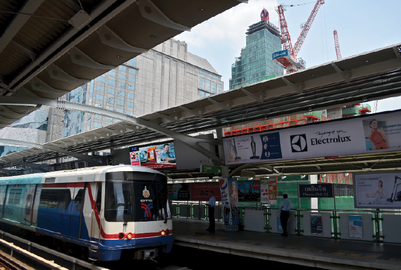
TV ads on BTS: Another frequent complaint is the blaring advertisements on closed circuit TVs placed at all BTS stations and inside trains. One website has a petition for commuters to sign. The petition, addressed to the Bangkok Mass Transit System, says: “Stop the noise ...The constant and loud noise of TV ads is disturbing, and poses long-term health risk to daily commuters, and in particular, young school children.” The noisy ads make the commute less comfortable, especially during rush hours when the platforms and carriages are full.
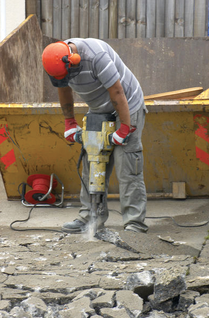
Heavy construction: This is one of the biggest sources of complaints, especially the use of noisy heavy equipment to hammer down foundation piles, from 7am until night, and sometimes all night. At least one embassy has been affected as well. Dozens of high-rise buildings are now under construction in Bangkok.
Shopping venues: It seems that any shop in any department store, plaza, mall or shopping centre in the city can be a source of excessively loud music. Sometimes the shops seem to be in a competition for who can be the loudest. What is the purpose? Surely this does nothing to boost sales.
Then there are the promotional events inside and outside the shops when an announcer, usually a woman, squawks non-stop into a microphone with speakers turned to the highest volume. Almost without exception shoppers walk by these promotions without as much as a glance, so it’s hard to see how the commotion can be justified. It just makes shopping unpleasant.
Shopping venues: It seems that any shop in any department store, plaza, mall or shopping centre in the city can be a source of excessively loud music. Sometimes the shops seem to be in a competition for who can be the loudest. What is the purpose? Surely this does nothing to boost sales.
Then there are the promotional events inside and outside the shops when an announcer, usually a woman, squawks non-stop into a microphone with speakers turned to the highest volume. Almost without exception shoppers walk by these promotions without as much as a glance, so it’s hard to see how the commotion can be justified. It just makes shopping unpleasant.
Coffee shops and restaurants: Restaurants and coffee shops also often offer music that is too loud for conversation. Sometimes the volume is deliberately turned up towards closing time to encourage customers to leave.
Night owls: In a city that never sleeps, late-night parties or quarrels, especially at lower rent apartments where night workers or party animals live, have long been a source of complaints for tenants with day jobs. One foreigner often grumbled about being woken up by neighbours arriving home after 2am. “It is difficult to get a good night’s sleep because they’re carrying on until 6am, and the walls are thin,” said the foreigner, who has now found quieter lodging.
Whistle blowing: The most outrageous and offensive sound in the city may be the almost incessant blast from a car park attendant’s whistle. The noise is really deafening and it feels degrading to be directed like cattle.
Airplanes: The noise from jet engines is a daily and inescapable nuisance for people living close to Don Muang and Suvarnabhumi airports.
Cinemas: Finally, the sound systems at most cinemas are surely over the safety level. Some doctors say they exceed 100 dB.
Volume stuck on high
Unfortunately, there are not many legal options against the noise makers. Complaints can be made at the local police station. They can act only according to the Thai Criminal Code B.E. 2499 (1956), Book III, Petty Offenses, Section 370, which states: “Whoever creates a noise, causes a noise or disturbance without a reasonable cause so as to frighten or trouble to the public, shall be punished with fine not exceeding one hundred baht.”
That may have been a significant sum of money 56 years ago, but these days the threat of a 100 baht fine wouldn’t do much to deter noise polluters even if the law were enforced.
Frequent complaints in the media about noise have fallen on the deaf ears of successive governments. This leaves it up to individuals to try to protect their hearing and sanity as best they can. Ear plugs are reasonably effective and they are cheap, although some people find them uncomfortable. Not surprisingly, a quick check with Bangkok hospitals revealed that doctors treating hearing problems aren’t short of patients.
Night owls: In a city that never sleeps, late-night parties or quarrels, especially at lower rent apartments where night workers or party animals live, have long been a source of complaints for tenants with day jobs. One foreigner often grumbled about being woken up by neighbours arriving home after 2am. “It is difficult to get a good night’s sleep because they’re carrying on until 6am, and the walls are thin,” said the foreigner, who has now found quieter lodging.
Whistle blowing: The most outrageous and offensive sound in the city may be the almost incessant blast from a car park attendant’s whistle. The noise is really deafening and it feels degrading to be directed like cattle.
Airplanes: The noise from jet engines is a daily and inescapable nuisance for people living close to Don Muang and Suvarnabhumi airports.
Cinemas: Finally, the sound systems at most cinemas are surely over the safety level. Some doctors say they exceed 100 dB.
Volume stuck on high
Unfortunately, there are not many legal options against the noise makers. Complaints can be made at the local police station. They can act only according to the Thai Criminal Code B.E. 2499 (1956), Book III, Petty Offenses, Section 370, which states: “Whoever creates a noise, causes a noise or disturbance without a reasonable cause so as to frighten or trouble to the public, shall be punished with fine not exceeding one hundred baht.”
That may have been a significant sum of money 56 years ago, but these days the threat of a 100 baht fine wouldn’t do much to deter noise polluters even if the law were enforced.
Frequent complaints in the media about noise have fallen on the deaf ears of successive governments. This leaves it up to individuals to try to protect their hearing and sanity as best they can. Ear plugs are reasonably effective and they are cheap, although some people find them uncomfortable. Not surprisingly, a quick check with Bangkok hospitals revealed that doctors treating hearing problems aren’t short of patients.
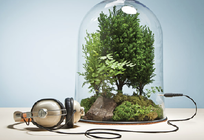
Peace & Quiet
Want to escape Bangkok’s noise?
See our round up of the city’s green spaces in Park Life!
Want to escape Bangkok’s noise?
See our round up of the city’s green spaces in Park Life!

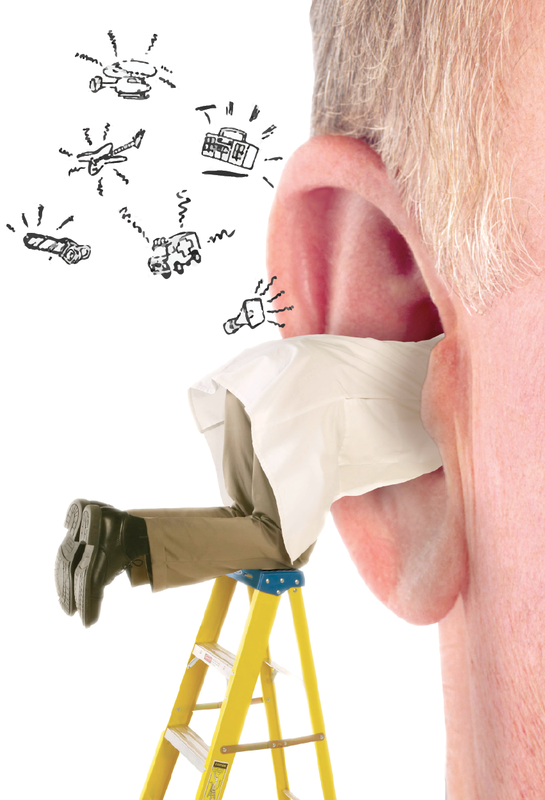
 RSS Feed
RSS Feed
















